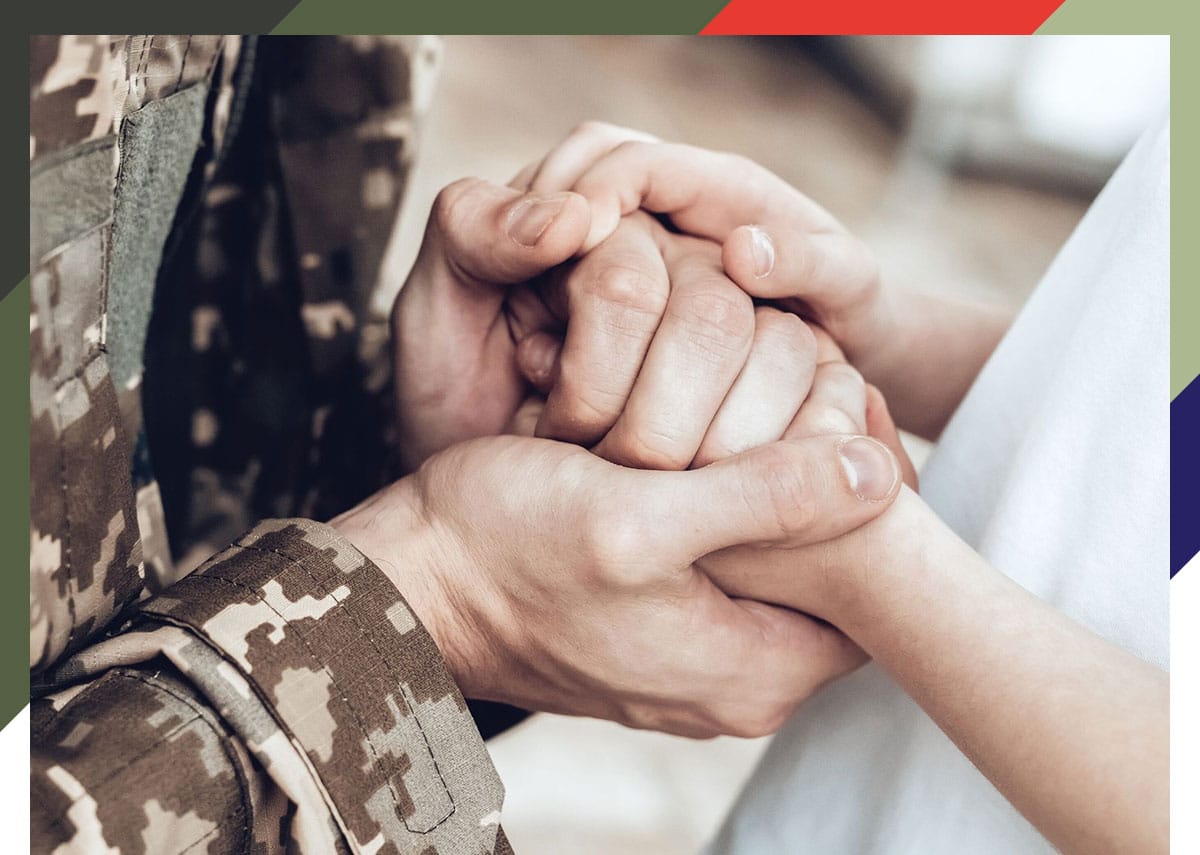My Hero Crate has made it our mission to improve the lives of veterans. Our method is to build military care packages for every branch of the armed forces and to ship them anywhere in the world, wherever your hero is living. We also support nonprofit, veteran-focused organizations because we put our money where our mouth is. We are not experts in mental health or military suicides. We aren’t trained psychiatrists with an in-depth knowledge of how the brain works. But we do care a whole lot. And that’s why this month, National Suicide Prevention Month, we wanted to share with you some of the research we found about helping military veterans access the care they need, should they ever experience suicidal ideation. If this blog post helps even one veteran and the people that care about them get through a difficult time, then writing it will have been worth it.
It is more than unfortunate that United States military veteran suicide has been a phenomenon for decades; the very first suicide prevention center opened in 1958 because of the prolific number of veteran suicides. In the years since, the U.S. and Veterans Affairs have taken steps to reduce rates of suicide by establishing additional mental health resources and legislation. It is difficult, however, to fix the root cause of the problem. According to a report published by the VA in 2016, an average of 20 veterans die from suicide each day. Further analysis of the VA study shows that the rate varies by age group. Sixty-nine percent of suicides involved veterans 50 and older, whereas 31 percent involved younger veterans. Ninety-seven percent of victims were male.
The National Center for Veterans Studies at the University of Utah and the VA both say there are risk factors that increase the likelihood of military veterans experiencing suicidal ideation:
It’s difficult to predict when someone may be considering suicide, especially if they tend to hide their emotions. However, there is a set of common warning signs you can watch for as you interact with your hero at home, over the phone, or via mail.
Don’t worry that if you ask your hero about suicidal thoughts or feelings, you push them into actually doing it. Giving them a chance to express their feelings can actually reduce their risk of acting on them. To do so, you can start your one-on-one conversation by asking some sensitive questions, like: You should also ask some direct questions, like: Your questions can continue to delve into more detail, like:
Most suicidologists agree that committing suicide isn’t a decision. In an essay by Gerben Meynen, a professor of forensic psychiatry at Utrecht University in the Netherlands, he argues that “having a mental disorder takes away a person’s ability to choose alternatives.” In fact, until the most recent edition of the Diagnostic and Statistical Manual of Mental Disorders (DSM), “loss of freedom” was listed as a component of mental illness. This description has now been updated to an “impairment in one or more important areas of functioning,” which is said to include “one or more losses of freedom.” It makes sense, then, that talking about suicide in a way that insinuates it is your hero’s choice would not be productive, and would instead shame them for their struggle. Never refer to committing suicide as selfish, stupid, cowardly or weak, a choice, or a sin, regardless of your personal beliefs.
If your hero is considering suicide, you can help them get the resources they need. You can encourage them to call the National Suicide Prevention Lifeline at 1-800-273-8255, and offer to sit with them as they make the call. To access responders with experience helping veterans, your hero should press “1” at the prompt. If they prefer to text with a responder at the Lifeline, they can send a message to 838255. Help them locate the phone number for their doctor at the VA to get access to the VA Mental Health program and VA Suicide Prevention program. There are so many non-profit organizations dedicated to veterans’ mental health — just like the ones we donate to with the proceeds from each of our military care packages. You can learn more about them at veteranscrisisline.net. Be supportive. Express your love for them, and your concern.
Your personal military hero is also ours. It is our sincere hope that you and your veteran will learn to stave off the thoughts of suicide while living your best possible lives together.
Ways You Can Help Your Hero in Need
A Long History of Veteran Suicide
The cause? It’s not precise, but the majority of veterans who commit suicide reportedly struggled with post-traumatic stress disorder (PTSD), depression, and combat-related guilt. Transitioning back to civilian life can also be quite difficult, especially after years in the military. Risk Factors for Veteran Suicide
Suicide Warning Signs to Watch For
How to Start the Conversation with Your Hero
What Not to Say
You should also avoid “making it about you.” It is likely your hero has already thought about the repercussions of suicide and how it may affect their loved ones, but still views it as the only escape from their feelings.What You Should Do
A Heartfelt Sign-Off from Your Favorite Military Care Package Experts
Category: Deployment
Why Human Connection is Important
A Care Package from My Hero Crate Can Help Provide It
Humans are social creatures. Sociologists and archaeologists have uncovered proof that even ancient humans lived together, hunted together, and enjoyed social activities. These preferences for socialization are thoroughly ingrained in our daily lives. They provide us with parts of our identity and teach us skills to lead successful lives. Having human connection is so vitally important, and for many reasons.
Joining the military can feel isolating, especially as deployments put unimaginable physical distance between soldiers and their families and other loved ones. Thankfully, part of being in the American armed forces is the camaraderie and team spirit among military branches and units. Discharging from the military, then, can be quite difficult, as veterans are forced back into the civilian world among people who don’t fully understand their experiences.
So, how can armed services members and veterans still get the valuable human connections and understanding they need when faced with a sense of isolation? And what does human connection look like? This month, My Hero Crate explores this important topic.
Perception of Human Connection
Depending on the environment you grew up in, your personal preferences, and your mental state, human connection may look different to you than it does to others. Data from university research shows that simply having access to a supportive person is sufficient to help someone adapt to stress — including stress of a new lifestyle.
In this case, there is no physical, ongoing human connection, but just the knowledge that it is available. Sometimes, people who are particularly independent need only this to feel connected. However, other people require more intensive interaction to feel a sense of belonging and safety. Human connection looks different to everyone.
The Benefits of Belonging
Having a support system and feeling a sense of belonging is not only necessary to human development, but it also helps our health.
The lack of human connection has been shown to be more harmful to your health than obesity, smoking, and high blood pressure individually. Connections also can relieve feelings of anxiety and depression and help us regulate emotions. When we feel a sense of belonging or that people care about us, we tend to have higher self-esteem. People who feel they have strong support systems, including friends and family, tend to have stronger immune systems, too!
Human connection can also help you live longer. A review of 148 separate scientific studies with more than 300,000 participants shows that those with stronger social relationships had a 50 percent increased likelihood of lengthier survival times. These results remained true across a number of factors, including age, initial health status, and cause of death.
Social connectivity and a sense of belonging also decrease the risk of suicide. Although quite a few factors lower the risk of suicide, one of these is connectedness. According to the Centers for Disease Control and Prevention, connectedness is, “the degree to which a person or group is socially close, interrelated or shares resources with other persons or groups.”
Healthy relationships, friendships, and close family ties are proven to reduce the risk of suicide. This connection, then, is especially important for a demographic like military veterans, of whom 22 die of suicide per day and up to 30 percent suffer from post-traumatic stress disorder.
Getting the Connection
So how can military veterans or current personnel get the most from their opportunities for human connection? Here are a few ways you may find appealing:
-Support groups for veterans
-Volunteer opportunities for a cause you support
-Living near or with a family member or other loved one
-Weekly family dinners if you live separately
-Participating in therapy with a counselor or in a group session
-Joining a club or enrolling in a continuing education class
-Working a job with supportive coworkers and bosses
-Choosing a hobby that requires interaction with others
Show Your Support and Caring with a Military Snack Box
For family members who are far away from their loved ones in the military, showing your support can help remind your favorite soldier that you’re there for them. My Hero Crate’s military care packages can help you do that. Select a care package of your choice, and we’ll send it to your hero, no matter where they’re stationed.
Order a care package today to stay connected to your hero.
Fun Games to Play via the Mail
Add an Element of Fun to your Letters
If your favorite member of the military is deployed overseas or away at basic combat training, your interactions are limited to short phone calls and heartfelt letters sent in the mail. It’s sometimes hard to come up with motivating and inspiring words to share in your notes when you’re missing your soldier or soldier-in-training and wish they were back home with you.
The fact is, no matter what you say in your letters, no matter how mundane the topic of conversation is, your soldier treasures your handwritten mail because it’s a connection to you — a fiancée, parent, sibling, or dear friend.
Liven up your weekly letters by adding a quick, paper-based game on a sticky note or index card. Play your first turn, and mail it to your soldier. They’ll play their turn, and send it back to you with their next letter, continuing until the game is complete. Here are a few games you can play via the United States Postal Service!
Tic Tac Toe
This classic game doesn’t need explaining; everyone knows how to play! Draw up your nine-sectioned game board, and decide who will be Xs and who will be Os — and write it on your note so no one forgets! Who will win this game of strategy? You’ll soon find out!
Dots and Boxes
For a longer-term pencil-and-paper game, draw up an empty grid of dots in the desired size. Take turns adding a single horizontal or vertical line between two unjoined, adjacent dots — no diagonals allowed! The player who completes the fourth side of a box earns a point and writes their initial inside the box before taking another turn. The game is over when every box is claimed. The person with the most completed boxes wins.
Hangman
Come up with a word or short phrase, but keep it a secret! Instead, draw lines with spaces between to represent each letter. Your loved one can take guesses as to which letters fit into the words, Wheel of Fortune style, without the spinning! If they get a letter right, write it into the space. If the letter is wrong, add a component to a hangman drawing. If you don’t like the idea of drawing a hangman, your drawing can be anything — a dog, cat, boat, car, or anything else you prefer, to keep the game light.
Sprouts
Draw several dots in a random pattern on your sheet of paper. We recommend starting with four or five, but you can play with as few as two. Each player will take turns drawing a line between two dots (or a dot back to itself) and adding a new spot somewhere along the line. The lines can be straight or curved, but can never touch or cross a line. The new dot a player adds cannot be placed on an existing endpoint, and no spot can have more than three lines attached to it. The game is over when a player is the last to draw a line that follows these rules. Like Dots and Boxes, this game is rooted in mathematical strategy!
Gifts for Military Members
When basic combat training is over, or if you’re looking for something more special than a pencil-and-paper game board to send your loved one overseas or stationed on base away from home, My Hero Crate builds and sends military care packages for your heroes!
Each My Hero Crate contains an assortment of military-approved snacks and treats, all sourced from American suppliers. Choose from our specialty military care packages, including gift boxes for soldiers with special diet requirements, or purchase a monthly snack box subscription so your hero gets an Army care package twelve times a year — or whichever branch of military your loved one serves in!
What is PTSD?
It’s a Common Mental Health Issue that Affects Many
Posttraumatic Stress Disorder (PTSD) is a mental health problem some people develop after experiencing or witnessing a life-threatening event, like military combat. It’s perfectly normal to have upsetting memories, emotional reactions, or issues falling asleep after such traumatic events. Some people feel better within a few months, but people who have prolonged symptoms might have PTSD.
Frequency of PTSD in Military Veterans
It’s very common for members of the armed forces to develop PTSD. No one should ever feel alone for struggling with it. In fact, according to Veterans Affairs, between 11 and 20 percent of every 100 veterans of Operation Iraqi Freedom and Operation Enduring Freedom have PTSD.
PTSD didn’t start during these most recent times of war, however. Twelve percent of veterans of the Gulf War, also called Desert Storm, have been diagnosed with PTSD. And even as far back as the Vietnam War, about 15 percent were diagnosed in the late 1980s, but today it’s estimated that 30 percent of Vietnam veterans have had PTSD in their lifetime.
Who Can Develop PTSD?
Anyone can develop PTSD at any point in their lives, even from a very young age, if they’ve experienced a long-lasting or short, but very intense traumatic event. Risk of developing PTSD is heightened if the person does not get immediate or appropriate care after the trauma, or if they don’t have enough social support. Of course, it’s possible even with these in place, a person can still develop PTSD, and it isn’t their fault at all.
What Are the Symptoms of PTSD?
There are generally four types of PTSD symptoms, and not everyone will experience them in the same way.
1.Reliving the event, which can cause feelings of fear, nightmares, or the sense that you’re experiencing the event all over again.
2. Avoiding situations that serve as reminders of the trauma, such as not talking about the event, avoiding crowds or driving, or whatever else may remind you of what happened.
3. Experiencing negative changes in your emotions or beliefs, such as no longer having loving feelings toward other people, or taking on a negative worldview.
4. Feeling hyper-aroused, also known as feeling overstimulated. The VA refers to this as “feeling keyed up.” This sometimes causes you to feel very irritable, lose sleep, have trouble concentrating, or startle easily.
PTSD Treatments
The most successful PTSD treatments are trauma-focused psychotherapies. This type of treatment helps to process traumatic experiences.
The VA uses:
- -Prolonged Exposure: teaches those with PTSD to face their negative feelings, including talking about the trauma.
- -Cognitive Processing Therapy: teaches those with PTSD to reframe their negative thoughts about the trauma and focuses on discussing negative thoughts.
- -Eye Movement Desensitization and Reprocessing: helps make sense of trauma by thinking about the trauma while paying attention to back-and-forth movement or sound (like a finger waving side to side, or a single tone).
How Can I Support Someone with PTSD?
If your loved one is suffering with PTSD, there are a few ways you can help support them.
- -Don’t force them to talk about their trauma if they don’t want to.
- -Anticipate their triggers. For example, if you know a certain sound will trigger a negative memory of the traumatic event, prepare for the trigger. Come up with a plan with your loved one about what you can do when they experience a trigger.
- -Do normal things in a normal routine. Don’t avoid everyday actions, stop planning vacations, or cease normal functions. A sense of normalcy goes a long way in helping those with PTSD.
- -Remain calm during emotional outbursts and let your loved one know they are safe.
- -Meet with your loved one’s mental health providers to learn how you can help in their specific situation.
Why My Hero Crate Cares About PTSD
My Hero Crate cares deeply about our service men and women and works every day to help enhance their lives, not just through creating special care packages for the military, but also by donating proceeds to veteran-backed organizations. We understand that mental health issues can be difficult to manage, and we hope our work will be a light in the dark for those who benefit from the organizations we support. Shop our military care packages to send to your favorite hero.
Enter To Win 1 of 5 Military Snack Care Packages!
Enter to Win a Military Snack Care Package!
To celebrate our website launch we are GIVING AWAY FIVE Military Snack Care Packages! Share it with someone you care about! We will announce the winners on Memorial Day.
HOW TO ENTER:
•Follow @myhercrate on Instagram or Facebook
•Tag three friends on a contest post
•Like our page
•Sign Up For our newsletter below
No Purchase Necessary. Must be 18 Years or Older to Enter. Must Live in the United States. Shipping address must be in the United States, US military bases only (dpo/fpo/apo). This contest is not affiliated in any way by Instagram or Facebook. Contest begins 5/18/2020 12A EST and Ends 5/25/2020 12P EST. Winners will be drawn Monday, 5/25/2020 12P EST and announced on both Instagram and Facebook.
Sign-up For Our Newsletter!
Sign up for our monthly newsletter and we’ll get you up to date on what we’re working on, as well as making sure you have the latest and greatest deals we have to offer!
Three Ways to Jazz Up Your Snail Mail
Loved Ones in the Armed Forces Treasure Your Letters
When your soldier is deployed, or your recruit is away at basic combat training, all the branches of the military recommend sending letters to your loved one the old-fashioned way. These motivating letters help your favorite military member get through each day. Training and deployment aren’t easy times.
Depending on your soldier’s or recruit’s location and training status, you will want to take great care with what you send in the mail and how you send it. Here are three ways you can make your mail extra special without attracting attention from the drill sergeant or breaking any rules.
The Boot Camp Exception: Keep Basic Training Mail Simple
The least conspicuous mail to your recruit at boot camp can be, the better. Use plain white envelopes, and write only their address and your return address on the outside. Avoid adding stickers, doodles, or other messages to the outside of the envelope. It can be tempting to make the letter look fun and exciting, but it’s sure to catch the attention of the drill sergeant during mail call.
The best way to jazz up mail at boot camp is to include one or two small photos, or reserve drawings or motivating messages for inside the letter itself. Your recruit can open their mail away from prying eyes and be able to privately enjoy the character you’ve added to their mail.
If you don’t want to deal with the hassle of having photos printed, then picking them up, and hoping they fit inside the envelope, you can use your home printer to add images directly to the paper you write your letter on. This also simplifies the number of items your recruit will need to keep organized in their limited storage space.
Most military bases will recommend that you not send armed forces care packages to your recruit during boot camp, unless they specifically ask for an item.
Talk About What’s Important
Instead of rambling on about all the things your military member is missing back home, especially if you have a recruit in boot camp, focus your letters on their training, their goals, and the relationships they’re building. This is much more motivating and less likely to make them feel homesick.
Similarly, deployed troops love receiving motivating letters, too. It helps them focus on the task they’ve been sent to do. It’s also only natural to want to keep your soldier updated on everything that’s happening back home. Use your best judgement on how to share those details. Remember that letters from home always stir up emotions.
Add Something Unexpected
Outside of boot camp, you can dress up letters to your soldier with less risk of attracting attention. While you might consider tossing in a small amount of confetti for flair, especially on a birthday, your soldier will be expected to clean up every piece!
Instead, you might change up the way you’re writing your letters. For example:
- Write a letter, journal-style. Work on the letter over a period of a week, dating each new section. This will provide you with chances to write a little bit or a lot each day. Hearing about your days in snippets can be comforting and show your soldier just how quickly the time is passing.
- Include newspaper clippings, magazine cut-outs, or other tidbits from your soldier’s favorite news source, or about their favorite topic. It’s especially poignant if it’s related to their hometown or somewhere special to them.
- Make your own greeting card, with your own art, out of plain cardstock. Paint, draw, color, or collage the front of it to customize it.
- Send a military-themed care package. Soldiers love receiving snacks and other items from their loved ones. If they’re deployed overseas, you can even take advantage of domestic shipping rates for base addresses. My Hero Crate is pleased to offer military care packages for all branches. Each of our carefully curated gift boxes includes American products from American distributors and comes with free shipping, making sending a special package even easier. But remember: don’t send a care package to a recruit at basic training!
Learn more about My Hero Crate and our new snack box subscriptions. You can shop our full selection online, including our gluten-free, dairy-free, and vegan options.
Strengthening Your Long-Distance Relationship with Your Soldier
Share How Much You Care with Snack Boxes for Deployed Troops
Distance makes the heart grow fonder, as the old saying goes. This is especially true when your soldier is deployed overseas or stationed on a far-away military base, and you miss out on the daily interactions you normally get to enjoy when they’re safe at home.
Maintaining a long-distance relationship of any kind — romantic, familial, or friendship — can be tough. That’s because when you’re far apart, it takes more effort to stay connected emotionally. No matter how many letters you send or phone calls you make, the distance never shortens.
However, you can make your long-distance relationship a little easier with these tips.
Find a Way to Communicate that Works For Both of You
Maybe you feel like you need daily phone calls to keep in touch, or you wish your soldier mailed you more heartfelt letters instead of the short notes you’ve been receiving. Perhaps your soldier’s schedule is busy and exhausting, so they are unable to fulfill those wishes. It could also be the other way around, too!
Before accusing your partner, family member, or friend of forcing you to do all the work in the communication department, discuss both of your expectations for communicating: type of communication, frequency of communication, and duration of communication.
Types of communication are things like phone calls, letters, emails, video calling, and social media chats. Frequency means how often you communicate. Duration means how long you set aside to communicate for each time you talk. Deciding on each of these three communication categories helps you set expectations so no one feels disappointed.
Prioritize The Relationship
When you make your relationship a priority, the relationship remains strong. The moment one person begins to prioritize other duties or leisure activities over the relationship, it will be difficult to fully recover from. For example, if you call your son or daughter where they’re living on base, and they never want to talk to you, you might subconsciously call less frequently. If your soldier writes you letters every week, but they never receive one in return, their letters might subside over time. Instead, when you prioritize the relationship, including communication, you show that you care for the other person.
Continually Show You Care
Actions speak louder than words — another old saying that we think is true! You can tell someone verbally how much you care about them every minute of the day, but if you don’t act like you care, then your message doesn’t seem genuine.
One way to show your soldier you care is by sending military care packages or subscription snack boxes to them wherever they are stationed, even if they are overseas. It’s even more meaningful if that care package was created and shipped by an all-American company, with all-American suppliers. At My Hero Crate, that’s exactly what we do! You can choose a monthly subscription or a one-time shipment of one of our care packages for soldiers to make your loved one smile and think fondly of you, no matter how many miles separate you. And yes, we deliver these military-member gifts anywhere in the world, included in the price of the care package.
Other ways to show you care are:
- Planning surprises or special outings when they visit home
- Upholding your end of the bargain, by always responding to communications and keeping your promises
- Supporting military members in any capacity you can, such as through donation drives, or simply in your daily speech and actions
No matter what method you choose to express how much you love your soldier, they’re sure to feel the energy that exudes when they talk to you or spend time with you.
We think that by following these tips, you’re sure to maintain healthy relationships with your loved ones in the military.






